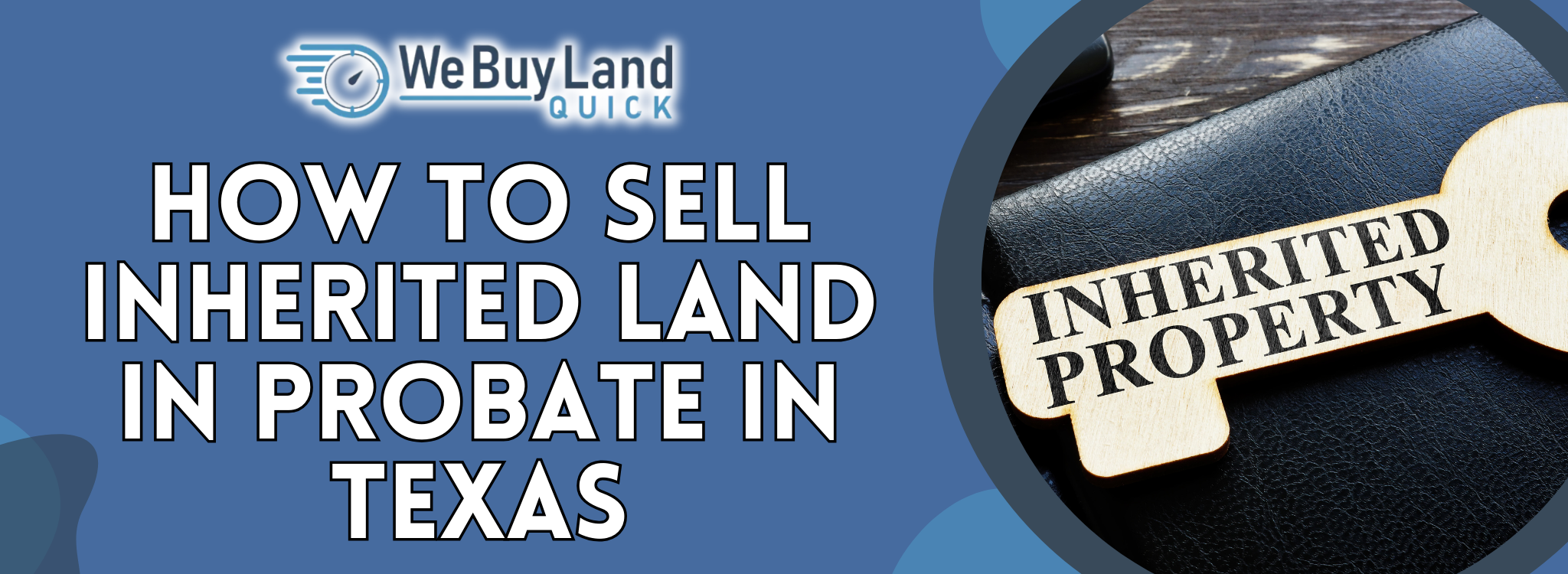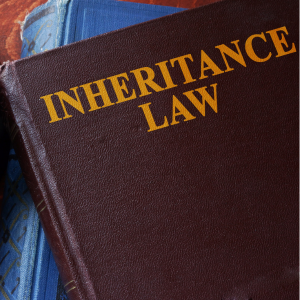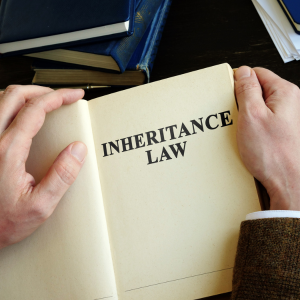
Key Considerations When Selling Inherited Land in Texas
Selling Texas inherited land requires knowledge of several financial and legal issues. A good transaction depends on knowing Texas probate rules and the procedures required for a probate sale agreement. Managing estate liquidation requires knowledge of state laws and market trends to maximize earnings on Texas property.
Understanding Probate’s Impact on Your Sale

Selling inherited land in Texas is significantly influenced by the probate system. Using Texas inheritance laws entails court procedures to confirm the will and control asset distribution. Knowing Texas’s probate schedule will assist you in determining when you might list the property and wrap up the sale. Knowing probate legal standards will help to prevent problems or delays when selling real estate subject to probate.
How to Determine the Value of Inherited Property
Accurately evaluating inherited property sometimes requires a property appraiser knowledgeable in probate proceedings. Essential for listing and negotiations on sales, an assessment conducted during probate offers a real sense of market value. Another crucial prelude to seeing real estate probate listings is title clearing. Clear titles and accurate values attract possible purchasers and help an estate in Texas be successfully sold.
What Role Does an Executor Play in Selling Real Estate?
The executor of an estate has important responsibilities when selling real estate. In Texas, these responsibilities include managing estate assets, working with probate real estate professionals, and ensuring that all acts follow state regulations. The executor is critical in transferring property after death, requiring meticulous attention to detail and conformity to legal guidelines.
Standard Legal Requirements for Probate Sales in Texas
Understanding the legal procedures for probate sales is critical when selling inherited property in Texas. Understanding Texas probate laws entails studying intestate succession rules and potential probate expenses. In Texas, issues such as will contests may arise, necessitating the assistance of a probate lawyer. Understanding these issues ensures compliance and facilitates conflict resolution.
Why Engage a Texas Probate Attorney?
Hiring a Texas probate attorney is advisable when dealing with intricate estate planning and inheritance issues. A probate lawyer facilitates estate settlements while adhering to all legal standards. Their knowledge is critical in managing the complexities of estate planning in Texas, providing peace of mind, and protecting your interests throughout the process.
Consulting specialists, such as attorneys or real estate experts in probate, can help you navigate these complexities more successfully. Begin listing today to guarantee that your inherited Texas land is properly advertised and produces the best benefits.
Preparing Inherited Land for Sale
How Can You Improve the Marketability of Inherited Property?

Inherited properties can present challenges, but improving their marketability can significantly increase appeal.
- Enhance Curb Appeal: First impressions matter. Simple landscaping, painting, and cleaning can make a big difference.
- Stage the Property: Proper staging helps potential buyers imagine living there, increasing desirability.
- Address Legal Concerns: Complete all necessary probate procedures. A real estate probate listing can help organize the sale, especially under Texas property inheritance laws.
- Highlight Unique Features: Emphasize unique features like historical significance or location benefits.
What Are the Necessary Repairs Before Selling?
Identifying and completing necessary repairs is crucial for presenting the inherited property well.
- Structural Integrity: Check for foundation, roof leaks, or plumbing problems. Fixing these ensures the home passes inspection.
- Cosmetic Updates: Fresh paint, new fixtures, and modern appliances can enhance appeal without large investments.
- Legal Compliance: Make sure the title for inherited land is clear. Consult a Texas probate real estate professional to prepare the title for transfer.
Is a Property Appraisal Essential?
A property appraisal is important, especially for inherited real estate sales.
- Accurate Valuation: A property appraiser probate provides an accurate valuation, helping set a competitive price.
- Negotiation Tool: An appraisal is powerful, giving buyers confidence in the property’s worth.
- Probate Court Requirements: A land appraisal probate is sometimes needed for the probate process.
Benefits of a Pre-listing Home Inspection

Conducting a pre-listing home inspection offers several advantages:
- Uncover Hidden Issues: Identifying problems beforehand lets you address them early.
- Boost Buyer Confidence: Transparency reassures buyers, making them more likely to purchase.
- Streamline the Probate House Sale: Addressing issues early simplifies selling, especially with Texas probate requirements.
How to Select the Right Real Estate Professional for Probate Property
Choosing the right real estate professional for selling property in probate is key.
- Experience Matters: Look for experts who specialize as probate real estate professionals and understand local regulations.
- Check Credentials: Ensure they have experience with the legal details of probate real estate transactions.
- Consultation with a Texas Probate Attorney: Working with a knowledgeable attorney alongside your expert can ensure all legal aspects are handled correctly.
Financial Aspects of Selling Inherited Property
What Are the Probate Costs Involved in Texas?
When selling inherited property in Texas, it’s important to understand the probate costs. These can vary based on the estate’s complexity and court requirements. Common expenses include:
- Court filing fees
- Attorney fees
- Appraisal fees
The total probate fees in Texas may increase if there are disputes or additional legal actions. Knowing Texas probate laws helps estimate these costs. Consulting a local attorney can assist in managing expenses during the estate liquidation process in Texas.
How Do Capital Gains Taxes Affect Inherited Property Sales?

Selling an inherited property can lead to capital gains taxes. Texas doesn’t impose an inheritance tax, but the profit from selling the property may be taxable. Important points include:
- Fair market value: The property’s worth at inheritance time establishes the taxable gain.
- The holding period affects whether gains are taxed at long-term or short-term rates.
Understanding the tax implications for inherited property in Texas can help you plan the sale. A tax professional can provide tailored advice for your situation.
Understanding Tax Implications and Deductions
In Texas, there are several tax ramifications when selling inherited property. These include real estate taxes and potential deductions for improvements or mortgage interest, which may lower your tax liability. Understanding federal and state tax deductions associated with selling your inherited property is critical. Following probate legal procedures ensures that all tax liabilities are addressed. Keeping accurate records and engaging with specialists might help you improve your tax strategy.
Exploring Financing Options for Potential Buyers
Understanding financing options in Texas can make your property appealing to buyers. Common potential buyer financing methods include:
- Traditional mortgages
- FHA loans
- VA loans
Knowing real estate financing options helps you tailor your marketing to attract more buyers. Highlighting these buyer financing opportunities can speed up your property’s sale.
How to Manage Outstanding Liens Effectively
Managing outstanding liens is essential before selling an inherited property. To clear the title for inherited land, follow these steps:
- Conduct a thorough title search in Texas to identify existing liens.
- Contact lienholders to settle or arrange payment plans.
- Work with a real estate attorney to resolve all real estate liens in Texas.
Addressing these issues can facilitate a smooth transaction and boost buyer confidence. Proper management of legal and financial obligations leads to a successful property sale.
Managing Family Dynamics in Inherited Property Sales
Inheriting property frequently results in complex family dynamics, particularly when several heirs are involved. Emotional attachments to the family house or land may conflict with financial considerations. To manage these issues during an heir property sale, approach the situation with empathy and clarity. Open discussions about expectations, duties, and obligations reduce tensions and promote collaboration among family members.
How to Handle Multiple Heirs in a Probate Sale

Handling probate in Texas can be challenging, especially with multiple heirs. Each heir might have different opinions on how to proceed, complicating the sale. Understanding probate legal requirements ensures a smooth process:
- Identify All Heirs: Verify all potential heirs to avoid legal issues.
- Understand Texas Probate Laws: Familiarize yourself with state-specific laws governing probate sales.
- Seek Legal Guidance: Engage a probate lawyer to navigate legal intricacies.
Following these steps helps streamline the probate process and mitigate conflicts.
Creating Transparent Communication Among Family Members
Effective communication is vital to prevent inheritance disputes in Texas. Establishing clear dialogue channels among family members is crucial:
- Set Regular Meetings: Schedule consistent family meetings to discuss progress and concerns.
- Document Agreements: Document decisions made and ensure agreement by all heirs.
- Facilitate Open Dialogue: Encourage an environment where everyone feels comfortable expressing views.
Transparency builds trust and minimizes misunderstandings in managing inherited properties.
Mediation Options for Heir Disagreements
When disagreements arise over inheritance decisions, mediation can be effective. In Texas, probate lawyers often recommend mediation because:
- Neutral Ground: A probate lawyer or mediator provides impartiality during discussions.
- Focused Resolutions: Mediation focuses on reaching mutually agreeable solutions.
- Cost-Effective: Mediation is usually less costly and faster than court proceedings.
Mediation can prevent prolonged legal battles and preserve family relationships.
How to Allocate Proceeds from the Sale Equitably

Allocating sale proceeds from inherited property requires fair consideration of each heir’s rights and expectations. Key factors for equitable distribution include:
- Estate Executor Responsibilities: Follow the will’s directives and state laws.
- Transparent Accounting: Provide clear reports on financial transactions involved in the sale.
- Understand Inheritance Rights in Texas: Adhere to legal standards for fair distribution.
These practices promote fairness and reduce potential disputes over financial allocations.
What Happens When Heirs Cannot Agree on Selling?
When heirs can’t reach a consensus on selling a property, several outcomes may occur under Texas law:
- Probate Court Intervention: The court may intervene if heirs cannot resolve differences.
- Will Contests: Disagreements may lead heirs to contest the will’s validity.
- Intestate Succession: Texas intestate succession laws determine distribution if no will exists.
Engaging with a probate court in Texas clarifies these processes and guides families toward resolution. Act swiftly to minimize legal issues and expedite the process.
Streamlining the Probate Sale Process
Managing the probate process in Texas can be difficult, particularly when selling inherited property. Knowing how to streamline this procedure can minimize stress and result in a successful sale.
How to Expedite the Probate Timeline in Texas

The probate timeline in Texas can differ greatly based on various factors, like court schedules and estate complexity. Here are some ways to speed up the probate process in Texas:
- Hire a Skilled Texas Probate Attorney: An experienced attorney can help with legal requirements and ensure all paperwork is filed correctly and on time.
- Prepare Documentation Early: Have all necessary papers ready, such as the will, death certificate, and any property deeds.
- Maintain Regular Communication with Involved Parties: Keep open communication with beneficiaries and other stakeholders to avoid delays from misunderstandings or disputes.
Leveraging Technology for Efficient Listing Management
Technology is key to managing real estate probate listings efficiently:
- Use Advanced Listing Platforms: Choose platforms that offer comprehensive management to easily track inquiries and schedule showings.
- Employ a Specialized Probate Real Estate Professional: An expert experienced in probate sales can use technology to find potential buyers more effectively.
- Utilize Digital Marketing Tools: Use virtual tours and online ads to reach a broader audience and increase property exposure.
Steps to Complete a Legal Deed Transfer in Probate
Completing a deed transfer during probate involves several steps:
- Verify Legal Ownership: Ensure the deceased’s name is on the property title.
- Obtain Court Approval: File a petition with the probate court to transfer the deed.
- Prepare and File the Deed: Work with an attorney to draft and file the new deed with the county recorder’s office.
- Clear Any Liens or Encumbrances: Address outstanding debts or liens on the property to ensure a smooth transfer.
Marketing Strategies for Quick Sale of Inherited Land
Effective marketing strategies can quicken the sale of inherited land:
- Highlight Unique Property Features: Emphasize features like location, potential uses, and improvements.
- Use Professional Photography: High-quality images can draw more interest from potential buyers.
- Leverage Online Platforms: Promote the property on multiple real estate websites to boost visibility.
Using Professional Networks to Facilitate a Successful Sale
Building and using professional networks can help make probate real estate transactions smoother:
- Connect with Other Probate Real Estate Professionals: Collaborating can lead to shared resources and leads.
- Engage with Estate Planners and Attorneys: These professionals often have clients looking to buy properties.
- Join Real Estate Associations: Participate in expanding your network and accessing valuable industry insights.
By following these steps, you can streamline the process of selling inherited property through probate in Texas, using expertise and technology for a quick and efficient sale.
FAQs:
What Is The Process For Selling Inherited Land In Texas?
First, to sell inherited land in Texas, determine if it’s under probate. The probate verifies the deceased’s will in court. As an executor, you manage this by getting appraisals, checking probate legal requirements, and possibly hiring a Texas probate attorney.
How Do I Handle Probate Real Estate Listings?
Probate real estate listings require knowledge of Texas probate laws. If the property is in probate, consider using a real estate professional experienced in probate sales. They can list and market the property while following probate sale regulations.
Are There Any Inheritance Taxes When Selling Property In Texas?
Texas does not have an inheritance tax. However, federal estate taxes may apply if the estate’s value exceeds federal limits. Consulting a professional ensures compliance with tax regulations.
What Responsibilities Do Executors Have When Selling Inherited Property?
Executors inventory the estate, pay debts, and distribute assets to heirs. They handle the sale by arranging property appraisals, resolving title issues, and complying with Texas estate laws.
How Can I Transfer Property Ownership After A Death?
Transferring property after death often involves a deed transfer during probate. If there’s no will, Texas inheritance laws decide distribution. An heirship affidavit might be needed to prove ownership before selling.
What Should I Know About Texas Probate Timelines?
Probate timelines in Texas vary based on estate complexity. Generally, it involves opening the estate, notifying creditors, inventorying assets, and distributing them after legal obligations are met. Knowing the timeline helps plan the property sale.
Can Disputes Arise During The Sale Of Inherited Land?
Yes, disputes can happen, especially over ownership or valuation issues. A probate lawyer can help resolve these disputes and protect your interests.
What Role Does A Probate Lawyer Play In Selling Inherited Real Estate?
A probate lawyer ensures compliance with Texas estate settlement laws. They assist with paperwork, explain executor duties, handle intestate succession, and help complete estate settlements efficiently.
Key Insights
- Selling inherited land in Texas requires understanding the probate process and Texas probate laws. These are crucial for a successful sale.
- Clearing the title for inherited land is essential to selling inherited real estate in Texas. Ensure all legal documents, such as the Texas heirship affidavit and deed transfer probate, are properly handled.
- The probate court in Texas oversees the probate process timeline, guiding executor duties for seamless estate liquidation.
- Understanding intestate succession in Texas is crucial if the deceased left no will. This affects Texas inheritance rights and property title search necessities.
- Engaging a probate lawyer in Texas can help navigate the intricacies of the probate process, including preparing for will contests and probate sale agreements.
- A probate real estate professional specializes in managing property sales in Texas during probate, from property appraisals to finalizing an estate settlement.
- Texas estate planning should account for potential inheritance disputes and probate fees to ensure minimal complications for future generations.
- Executors should understand their responsibilities, including managing probate timelines in Texas for the effective execution of duties.
- Our team offers expert guidance on the Texas inheritance process, from selling deceased estate property to leveraging property appraisal probate insights.
- Start your journey with us to efficiently manage your inherited property. Learn about Texas heirship laws and probate house sale procedures. Start Listing Now!
Want to sell your land in Texas? We’re here to help! Whether you’re in Houston, San Antonio, Dallas, Austin, Fort Worth, El Paso, or any surrounding area, we make the process simple and hassle-free. We buy land across Texas and can guide you through every step of selling your property. Read on to learn more about how to sell land in Texas, and if you need expert assistance, don’t hesitate to Contact Us at (469) 529-7977.


